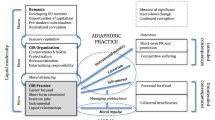Abstract
From a tradition of discourse ethics, human dignity can be defined as “being an equal member in the realm of subjects and authorities of justification.” Additionally, “to act with dignity means being able to justify oneself to others; to be treated in accordance with this dignity means being respected as such an equal member.” Conversely, “to treat others in ways that violate their dignity means regarding them as lacking any justification authority” (Forst 2013, p. 101). The guidelines found in Habermas’s “ideal speech situation” (ISS) are essential to guarantee this notion of human dignity. Based on aspects of Habermas’s (ISS), as well as Rainer Forst’s theory of justice, this study analyzes efforts made by the late speaker of Deutsche Bank, Dr. Alfred Herrhausen, and the former CEO of Alcoa and United States Secretary of the Treasury, Paul H. O’Neill, to challenge the way debt crises in the developing world were handled. Both leaders understood indebted countries, the livelihoods and dignity of its citizens, not as an external entity but as an integral part of their agendas. The two agents included underrepresented groups in their considerations and discussions through a proxy or surrogate participation, giving them a greater voice and acknowledging their dignity.
Similar content being viewed by others
References
Balkhausen, D. (1990). Alfred Herrhausen: Macht, Politik Und Moral. Düsseldorf: ECON Verlag.
Black Box BRD. (2001). Written and directed by Andres Veiel. DVD, Germany.
Der Spiegel (1989). Dieser Mann Potenziert Das Problem. Der Spiegel, 20–28.
Deutsche Bank. (1981). Annual Report. Frankfurt am Main.
Deutsche Bank. (1988). Annual Report. Frankfurt am Main.
Forst, R. (2012). The right to justification: Elements of a constructivist theory of justice. New York: Columbia University Press.
Forst, R. (2013). Justification and critique: Towards a critical theory of politics. Cambridge: Polity Press.
Habermas, J. (1985). Theory of communicative action, volume 1: Reason & the rationalization of society. Boston: Beacon Press.
Habermas, J. (1998). Between facts and norms: Contributions to a discourse theory of law and democracy. Cambridge: MIT Press.
Habermas, J. (2000). The inclusion of the other: Studies in political theory. Cambridge: MIT Press.
Herrhausen, A. (1989). The time is ripe—debt crisis at the crossroads [orig. Die Zeit Ist Reif – Schuldenkrise Am Wendepunkt]. Handelsblatt.
Herrhausen, A. (1989). By G. von Boehm. Wortwechsel.
Kettner, M. (1993). Scientific knowledge, discourse ethics, and consensus formation in the public domain. In E. Winkler & J. Coombs (Eds.), Applied ethics: A reader (pp. 28–45). Oxford: Blackwell.
O’Neill, PH. (2002). Caring greatly and succeeding greatly: Producing results in Africa. U.S. Department of the Treasury. http://www.treasury.gov/press-center/press-releases/Pages/po3153.aspx.
Platthaus, A. (2006). Alfred Herrhausen: Eine Deutsche Karriere (1st ed.). Berlin: Rowohlt Taschenbuch Verlag.
Veiel, A. (2002). Black Box BRD: Alfred Herrhausen, Die Deutsche Bank, Die RAF Und Wolfgang Grams. Stuttgart: Deutsche Verlags-Anstalt.
Author information
Authors and Affiliations
Corresponding author
Rights and permissions
About this article
Cite this article
Kipper, K. Aligning Civic and Corporate Leadership with Human Dignity: Activism at the Intersection of Business and Government. J Bus Ethics 146, 125–133 (2017). https://doi.org/10.1007/s10551-015-2917-5
Received:
Accepted:
Published:
Issue Date:
DOI: https://doi.org/10.1007/s10551-015-2917-5




